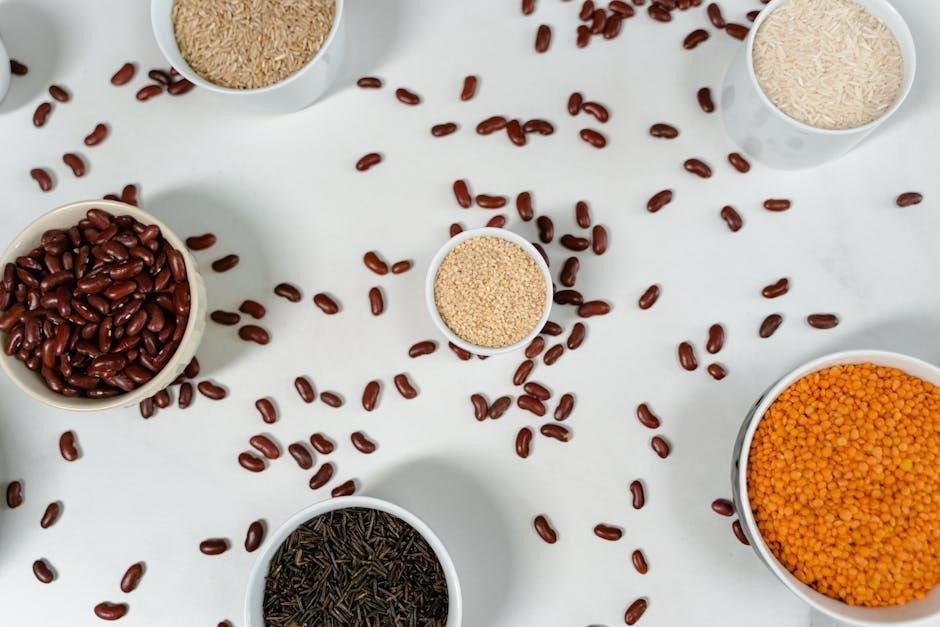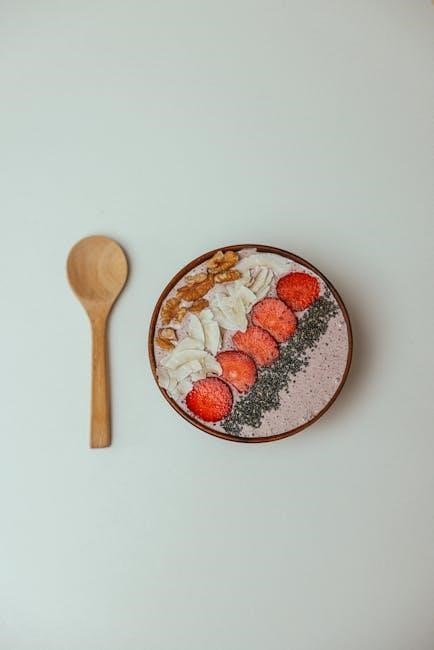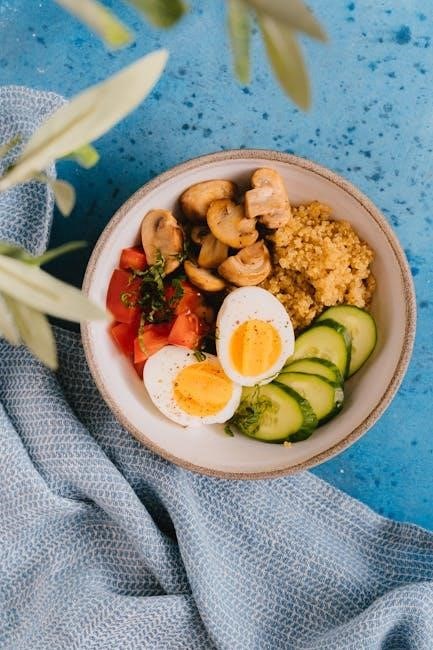A high protein, low-carb vegetarian diet combines plant-based proteins with minimal carbohydrate intake, promoting weight management and muscle growth while maintaining overall health and sustainability.
What is a High Protein Low-Carb Vegetarian Diet?
A high protein, low-carb vegetarian diet focuses on plant-based foods rich in protein while minimizing carbohydrate intake. It emphasizes foods like legumes, tofu, tempeh, and seitan, alongside low-carb vegetables and healthy fats. This diet avoids high-carb foods such as grains, starchy vegetables, and sugary snacks. By balancing protein and fats, it supports weight management and muscle maintenance, making it ideal for vegetarians seeking a structured and nutritionally balanced eating plan. The diet is flexible, allowing for creative meal planning while adhering to its core principles of high protein and low carbohydrate consumption.
Benefits of a High Protein Low-Carb Vegetarian Diet
The high protein, low-carb vegetarian diet offers numerous health benefits, including weight loss, improved blood sugar control, and enhanced muscle maintenance. It reduces carbohydrate intake, minimizing glucose spikes and promoting fat burning for energy. High protein content supports muscle growth and repair, ideal for those engaging in regular exercise. Additionally, it encourages the consumption of nutrient-dense, plant-based foods, contributing to overall health and well-being. The diet’s focus on whole foods can also improve digestion and reduce inflammation, making it a sustainable choice for long-term health management and disease prevention.
Challenges of a High Protein Low-Carb Vegetarian Diet
Adhering to a high protein, low-carb vegetarian diet can present several challenges. One major difficulty is ensuring adequate protein intake without relying on animal products, requiring careful planning to include plant-based protein sources like legumes and tofu. Additionally, reducing carbohydrate intake while maintaining nutrition can be complex, as many vegetarian staples, such as grains and starchy vegetables, are high in carbs. Social and dietary restrictions, such as limited access to suitable low-carb vegetarian options when dining out, can also make sustained adherence challenging. Furthermore, the diet may require supplements to meet all nutritional needs, adding to the planning and financial burden of maintaining this lifestyle.

Meal Planning and Food Choices
Meal planning is crucial for a high protein, low-carb vegetarian diet. Focus on plant-based proteins like legumes, tofu, and tempeh, paired with low-carb vegetables and healthy fats.
High Protein Vegetarian Foods for a Low-Carb Diet
Incorporating high-protein vegetarian foods is essential for a low-carb diet. Tofu, tempeh, and seitan are excellent plant-based protein sources. Legumes like lentils, chickpeas, and black beans are also high in protein but should be consumed in moderation due to their carb content. Nuts and seeds, such as almonds, chia seeds, and flaxseeds, provide healthy fats and protein. Whole grains like quinoa and farro are low-carb and protein-rich. Low-carb vegetables such as spinach, broccoli, and zucchini complement these proteins. Eggs and Greek yogurt are great options for vegetarians. Meal prepping with these foods ensures a balanced and satisfying diet. These choices help maintain muscle mass and energy levels while adhering to low-carb guidelines.
Low-Carb Vegetarian Alternatives to High-Carb Foods
For a low-carb vegetarian diet, substituting high-carb foods with nutrient-dense alternatives is key. Replace pasta with zucchini noodles or spiralized vegetables. Cauliflower rice is a great substitute for regular rice. Tofu or tempeh can mimic the texture of grains in dishes like stir-fries. Portobello mushrooms make excellent low-carb “burger buns” or pizza crusts. Use lettuce wraps instead of bread for sandwiches. Low-carb vegetable-based soups and salads can replace hearty grain-based meals. Even snacks like roasted chickpeas or kale chips offer satisfying crunch without the carbs. These creative swaps ensure a balanced and flavorful diet while keeping carb intake minimal. They also help maintain variety and satisfaction, making the diet easier to follow long-term.

Health Considerations
A high protein, low-carb vegetarian diet requires careful planning to avoid nutrient deficiencies. Ensure adequate intake of iron, calcium, and B12, and consider supplements like BCAAs for muscle support.
Ensuring Adequate Protein Intake on a Vegetarian Diet
Maintaining sufficient protein intake on a vegetarian diet requires strategic planning. Incorporate high-protein foods like legumes, tofu, tempeh, and seitan. Additionally, include plant-based protein powders such as pea or hemp protein. Pairing complementary proteins, such as whole grains with legumes, enhances amino acid profiles. Nuts, seeds, and soy products are also excellent sources. For those with higher protein needs, consider whey protein supplements. Regularly monitoring protein intake and adjusting meal plans can ensure nutritional balance. A well-structured vegetarian diet can meet all protein requirements, supporting muscle growth and overall health effectively.
Balancing Macronutrients for Optimal Health
Achieving macronutrient balance is crucial for a high protein, low-carb vegetarian diet. Protein should comprise 30-40% of daily calories, sourced from legumes, tofu, and plant-based proteins. Carbohydrates, limited to 20-30%, should come from low-carb vegetables, nuts, and seeds. Healthy fats, making up 30-40% of calories, are derived from avocados, olive oil, and nuts. This balance supports energy levels, weight management, and overall health. Regularly tracking macronutrient intake ensures sustainability and effectiveness of the diet plan, promoting long-term well-being while adhering to vegetarian principles.

Exercise and Weight Management
Regular exercise complements a high-protein, low-carb vegetarian diet, enhancing muscle growth and metabolism. Strength training and cardio boost fat loss and support sustainable weight management effectively.
How Exercise Supports a High Protein Low-Carb Vegetarian Diet
Exercise plays a vital role in enhancing the effectiveness of a high-protein, low-carb vegetarian diet. It boosts metabolism, aiding in fat loss and muscle preservation. Strength training, in particular, helps build lean muscle mass, which is essential for long-term weight management. Cardio exercises like jogging or cycling complement this by burning excess calories, supporting the diet’s goals. Additionally, physical activity improves protein absorption and muscle synthesis, maximizing the benefits of high-protein vegetarian foods. Regular exercise also enhances overall health, ensuring sustained energy levels and mental well-being. Combining a structured workout routine with a balanced diet creates a holistic approach to achieving and maintaining a healthy, active lifestyle.

Tips for Maintaining Weight Loss on a Vegetarian Diet
Maintaining weight loss on a vegetarian diet requires consistent effort and mindful eating. Tracking your calorie intake helps ensure you stay within your goals. Incorporating high-protein, low-carb foods like legumes and tofu supports satiety and muscle retention. Meal prepping is essential for avoiding unhealthy choices, while staying hydrated enhances metabolism. Regular physical activity, such as strength training and cardio, complements dietary efforts. Additionally, getting adequate sleep and managing stress are crucial for maintaining a healthy metabolism. Over time, these habits create a sustainable lifestyle that supports long-term weight management and overall well-being on a vegetarian diet.

Adopting a high protein, low-carb vegetarian diet offers numerous health benefits. Start by exploring meal plans and seek professional guidance for personalized success and sustainability.
Final Thoughts on the High Protein Low-Carb Vegetarian Diet
The high protein, low-carb vegetarian diet is a effective and sustainable approach for weight loss and muscle maintenance. It emphasizes plant-based proteins, low-carb vegetables, and healthy fats, promoting overall well-being. With proper planning, this diet can be nutritious and satisfying, helping individuals achieve their health goals. Resources like a high protein low-carb vegetarian diet plan PDF provide structured guidance, making it easier to implement. Always consult a healthcare professional before starting any new diet to ensure it meets your specific needs and health requirements. By combining balanced nutrition with regular exercise, this diet can lead to long-term success and improved vitality.

Where to Find a High Protein Low-Carb Vegetarian Diet Plan PDF
Accessing a high protein low-carb vegetarian diet plan PDF is straightforward. Reputable sources like Nutrition Hub, Ketogenic Diet Resource, and Plant-Based Protein Guide offer downloadable meal plans tailored to your needs. Websites such as VegMealPlans.com and LowCarbVegetarianDiets.net provide comprehensive guides. Additionally, online communities like Reddit’s r/vegetarianketo and Facebook groups dedicated to low-carb vegetarian lifestyles often share free or paid PDF resources. Ensure the plan aligns with your health goals by consulting a nutritionist or healthcare provider before starting. These resources make it easy to adopt and maintain a balanced high protein, low-carb vegetarian lifestyle with structured meal plans and expert advice.

Leave a Reply
You must be logged in to post a comment.